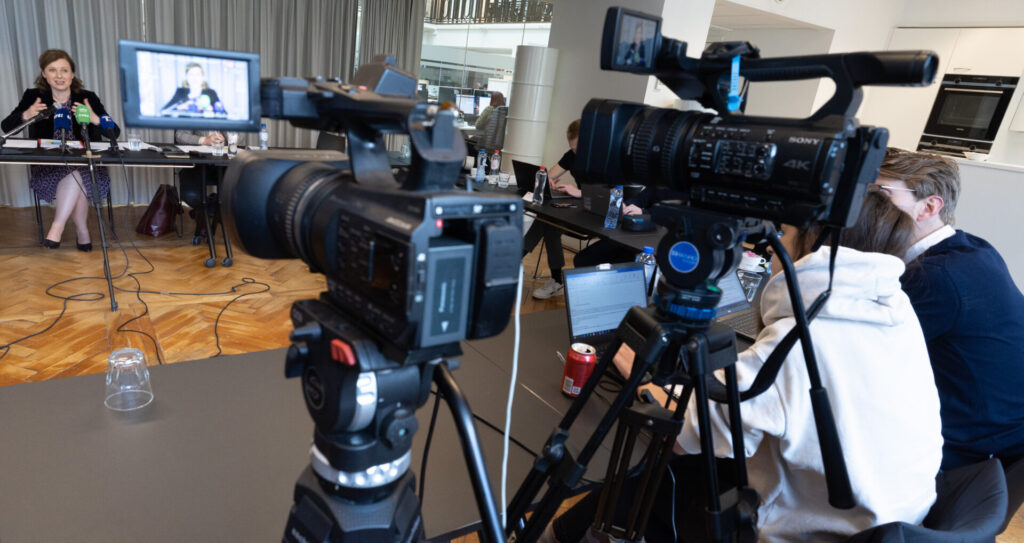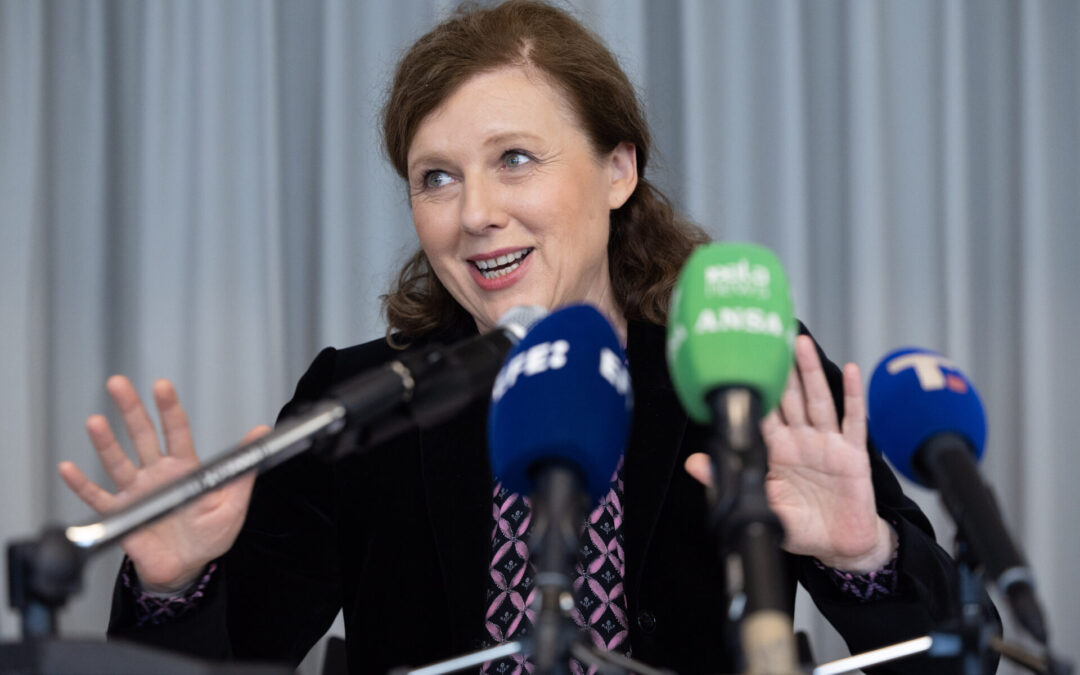 Have the article read by OpenAI (Beta). Please note that AI translations may take some time to process.
Have the article read by OpenAI (Beta). Please note that AI translations may take some time to process.The Vice-President of the European Commission for Values and Transparency, Věra Jourová, expressed her desire for the European Union to lead the fight for “courageous” journalists, who risk their lives to inform, as now in Ukraine or in countries with authoritarian regimes, and to become “a centre of media freedom.”
In an interview with the European Newsroom, ahead of World Press Freedom Day on 3 May, Jourová also called for “getting one’s house in order” on this issue, as the media were a pillar of the democratic system.
Jourová paid tribute to all journalists and media workers who “risk their lives to inform us”, such as those “who are now on the battlefield in Ukraine, who are on the front line under Russian bombs”, whom “we desperately need there” to know the facts.
The Czech politician also said she was thinking of journalists “working in authoritarian regimes, and those in prison.”
In particular, she cited the American reporter Evan Gershkovich, who was arrested by Russia in March, and called for “continuous pressure” to be put on Moscow to release him “because this is an outrageous attack on journalists and also on freedom of expression.”
“I want the European Union to lead the fight to protect these courageous voices, and I want the European Union to become what I would call a centre of media freedom,”
Věra Jourová said.
But in order to be that centre of freedom for the press, the EU had to have “its own house in order,” warned Jourová, who stressed the need to strengthen the independence of the press, protect the public media service and make information on the ownership of media companies public. There should also be transparency with regard to the money that authorities spend on institutional advertising and which media they choose to use for it.
European Media Freedom Act
Last September, the commission proposed the European Media Freedom Act (EMFA), a law to better protect independent media from state influence. It seeks to enshrine in law the principle of information as a public good, after the scandals of spying on journalists, doubts about the independence of public media or the opacity of government campaigns in the press.
This future law “is being criticised by many”, but “we are doing the right thing by alerting member states to maintain strong and independent public service media without state or party tendencies, because this is exactly what we see in Poland and Hungary.”
Referring to criticism of the planned law from German publishers, she said she had often explained to publishers what the proposal was about – and what it was not. For publishers, she said, it was hard to swallow that they were to be regulated at EU level for the first time.
This was not about lowering standards, the Czech politician said. “My message is that no system is absolutely immune.” For situations in which politics went mad in a country and new leaders had an appetite “to capture the media landscape,” she said, people would be glad to have a safety net in the EU. “This can happen anywhere.” The planned European Board for Media Services would not have any influence on the content of reporting.
The European Parliament and the EU member states are currently negotiating their respective positions on the proposed legislation. Member states could reach an agreement in the Council of the EU by the middle of the year. Parliament could follow suit in October. The two parties would then have to negotiate on a common position.
This proposal, Jourová explained, “also means welcoming independent media who have to flee censorship in their home country”, which was why Brussels was trying to “design effective help for Russian journalists living in exile in the EU” so that they could “continue to do their work.”
Brussels considers that the situation has greatly deteriorated in several member states and argues that “editorial freedom and the independence and strength of the media as important actors in the democratic system must be protected,” Jourová recalled.
She considered it “shameful” that there were “journalists who are being threatened, injured” in the EU, which was why Brussels had made a recommendation more than a year ago to the member states to defend them and was going to ask for results “at the end of this year.”
Responding to a question about the police raid on the newspaper Domani on March 4 to seize an article regarding Claudio Durigon, undersecretary at the Italian Ministry of Labour and Social Affairs and a member of the Lega party, Jourová pointed out that the commission had “tried to address this issue in the Media Freedom Act” proposed last September. “We propose to prohibit the member states or the politics interference into the life of media and into the editorial content.” Jourová added that the commission “cannot intervene, because it is an individual case in the field of law enforcement.”
She stressed the need to act, especially in Eastern European countries that were EU members now, but in the past had belonged to the Soviet orbit, where “strong media are needed to be able to counter the intense Russian propaganda” that “is bearing fruit because the ground is quite fertile.”

Defamation and SLAPPs
The Czech lawyer, who was Justice Commissioner in the last parliamentary term, also stressed that she did not want “abuse of the judicial system against journalists and freedom of expression” in Europe.
Brussels proposed the Anti-SLAPP Directive at the end of 2021, a regulation to strengthen the protection of journalists against abusive litigation, which was in the legislative process and “it is not easy” to carry forward, Jourová acknowledged, although she hopes that it could be approved before the end of this legislature in mid-2024.
Strategic lawsuits against public participation – commonly known as SLAPPs – are lawsuits filed against journalists, media outlets, and activists. They are regarded as a particular form of harassment against journalists, as the lawsuits typically drag on for years and hence require huge amounts of money and time from the defendant.
“I am convinced that journalists must be able to do their work without fear,” Jourová stressed, also pointing to the importance of the fight against disinformation.
“All that is crucial in times of elections, in times of war, but also in normal times, in any time democracy needs a strong media power. And that’s why we are doing all these things that are unprecedented,” she said.
“There are exceptions related to the possible suspicion of crime or endangering national security: this,” she admitted, “will always be the justification we will hear from member states when these things happen, that there is a question of national security or some crime at stake.” According to the commission, alleged defamation is one of the most common reasons why SLAPPs are filed against journalists.
According to the annual report by the Council of Europe’s Platform for the Safety of Journalists, a coalition of fifteen press freedom NGOs and journalists’ associations, which was published on March 7, journalists and media outlets in Albania, Bulgaria, Croatia, France, Italy, Poland and Serbia are increasingly sued for defamation. The platform has registered several cases in which journalists have been fined over their reporting, among them, for instance, Mediapool.bg in Bulgaria. The fines ranged from EUR 1,000 to EUR 8,000. The day after the report was published, Lev Ins insurer has lodged an unprecedented half a million euro claim against Mediapool.bg.
Disinformation on Twitter
Regarding disinformation on Twitter, Jourová said that before the Digital Services Act (DSA) would come into force “there is still space for dialogue and I would really wish to explain to Mr. Musk our philosophy that we are protectors of freedom of speech, protectors of the freedom of expression. That’s why we created such a complicated system, which is the Code of Practice [on Disinformation]”, but “freedom of speech in the EU is not unlimited.”
In February, the commission published a report revealing how Twitter was lagging behind in the fight against disinformation, despite having voluntarily signed the Code of Practice on Disinformation. Jourová added that once the DSA came into force “this code will be considered as the tool which the platform might need to convince the enforcer that they are doing everything to mitigate the risk of disinformation.”
Jourová reiterated disappointment in the social network’s efforts to counteract the spread of fake news, and said she personally felt “more and more uncomfortable on Twitter, in the neighbourhood of unregulated Russian aggressive propaganda.”
“I cannot predict what will happen to Twitter” once the Digital Services Act came into effect, Jourová continued, but “I would compare the situation with driving on the highway: if you are overstepping the speed, you get penalties and one day you might be deprived of your driver’s license. This is a general vision of how the DSA will be applied in the future in cases of noncompliance.”
This article is published Fridays. The content is based on news by agencies participating in the enr.
